|
|
Turkey has had a long history of
protecting Jews; precisely why the nation's Sephardic Jewish population was
loyal until the end. Here are a few examples of how Turkish
diplomats lent a much needed hand to Jews during the dark days of the Second
World War.
|
|
|
| Holocaust
Survivor Says Turkish Muslim Saved His, Other Jews' Lives |
Rudi Williams, American Forces Press Service,
WASHINGTON, April 23, 2002—As
a child on the island of Rhodes in the Aegean Sea, Bernard Turiel remembers listening to
his parents and their
friends talk about Jews being executed in concentration camps in Germany and Europe.
Turiel remembers the horror stories about Jewish people's skin being made into lampshades
and their bones being used to make soap. "These kinds of discussions left a fear and
horrid impression on all of us," he said.
Turiel survived the Holocaust, he said, thanks to
Turks on Rhodes and because he and his family were Turkish citizens. During "Honoring
the Turkish Rescuers," a special program held recently
at Washington's Lincoln Theater, he talked about his World War II childhood experiences
and how a Muslim saved his family and many others.
Rhodes today is Greek. From 1912 until 1945,
however, the Aegean island, just off the southwestern coast of Turkey, was an Italian
possession.
Italian dictator Benito Mussolini joined Germany
in the war in 1940 and invited his ally to garrison troops in Italy and its possessions,
including Rhodes, Turiel said.
He said the island in the 1920s and 30s had a
flourishing Jewish community of about 5,500 Jews out of a population of about 35,000.
Although many Jews fled in the 1930s, those who remained on Rhodes were harassed by the
Italian administration but relatively safe until Mussolini was deposed in July 1943 and
Italy's provisional government declared an armistice with the Allies. The Germans used the
confusion to overwhelm their one-time allies and seize control the Italians'
"empire" in September 1943, he added.
"When the Germans took over, the adult males
were asked to report to the headquarters offices," Turiel said. "That created
great concern as to what was going to happen." The men were told to
register and go home. This created a sense of relief, but also one of false security. When
the Germans began rounding up Rhodes' Jewish community in July 1944, the men reported to
the German headquarters again, Turiel said, but this time they were immediately
incarcerated. Turiel and his father and brother were among the incarcerated. Two days
after being detained, the men were standing in line waiting for transport to the continent
and a concentration camp, Turiel recalled.
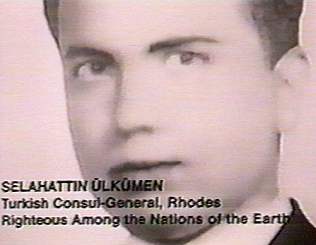 |
|
Selahattin
Ulkumen, from DESPERATE HOURS |
Enter 30-year-old Turkish Consul Selahattin
Ulkumen, who approached the German general in charge and demanded that all Turkish
subjects be released. He went further, demanding the spouses of Turkish citizens be
released, invoking Turkish law that anyone married to a Turk is a Turk. The Germans
assented.
Ulkumen was playing a dangerous game. He bluffed
the Germans — there was no
such law. "He was fully aware of the dangers for the Jewish community in Europe and
made a valiant effort to save as many Jews as possible, including non-Turkish
citizens," Turiel said. "He told my mother to go home and that our father would
be released. My brother and I had acquired Turkish citizenship and had dual
citizenship."
Ulkumen's bold personal action is credited with
saving 42 families. But his bluff didn't go unanswered. The Germans bombed his home in
retaliation. His wife, nine months' pregnant, was seriously injured and died of her wounds
while giving birth to the couple's son, Mehmet. Turiel said 643 of Rhodes' Jews were
deported to Auschwitz; all but 151 were exterminated or died in the labor camps.
Ulkumen left Rhodes in August 1944 when Turkey
ended diplomatic relations with Germany. Again, Jewish men were ordered to report to
German authorities, Turiel noted. Only a handful still lived on the island. Turiel said
the island was isolated, and the Germans by this time seemed more concerned about survival
than victory.
"They permitted us to eventually leave the
island in January 1945," said Turiel, a lawyer, who worked for the Federal Trade
Commission from 1959 to 1966. He's now an attorney in private
practice in northern New Jersey.
The Turiels left Rhodes for Turkey in January 1945
and emigrated to the United States in July 1946. Turiel's father joined his two brothers
in their import-export business.
Turiel told the Lincoln Theater audience that
Ulkumen was a man of great determination, courage and compassion. On June 11, 1988, the
Anti-Defamation League presented Ulkumen its fourth annual "Courage to Care"
award.
"He was brought to New York for the
presentation and we were reunited with him," Turiel noted. "My mother maintained
correspondence with him over the years."
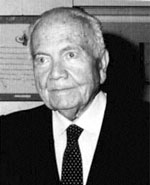 |
|
Selahattin
Ulkumen (1914-2003) |
In June 1990, Ulkumen was installed on the Avenue
of the Righteous Gentiles at the Yad Vashem in Israel. "What used to be known as the
Righteous Christians has been changed to the Righteous Gentiles because Mr. Ulkumen was
the first non-Christian to receive the award. He is a Muslim," Turiel noted.
"Mr. Ulkumen will always be remembered as a
courageous, compassionate and righteous person," Turiel said. "Today, he's frail
and living in an old age home in Turkey."
Turiel said he and his family and other Holocaust
survivors are extremely fortunate to have come to the United States.
"We're grateful to live in this wonderful
country where our forefathers had the great forbearance to think of the great democratic
country and the need for a Bill of Rights," he said. "The Bill of Rights
has provided the type of government and style of life that we enjoy and cherish. We never
take it for granted. Having experienced our lives in Europe, we're most grateful to be in
such a wonderful
country as the United States."
Web site honoring Mr. Ulkumen: www.ulkumen.net
|
RESCUE OF EIGHTY JEWISH TURKS
|
NECDET KENT’S RESCUE OF
EIGHTY TURKISH JEWS IN MARSEILLES, FRANCE
FROM HITLER’S GERMANY
(Editor’s Note: Jak Kamhi, a Turkish Jew, and prominent businessman in Istanbul
located Necdet Kent [now a retired ambassador] and obtained his personal account of
his rescue of some eighty Turkish Jews in Marseilles, France from Hitler’s
Gestapo. This deposition has been translated by Ayhan Özer and is reprinted below as an example of the proud
Turkish historical record of saving Jews from persecution and death.)
In 1941, I was assigned by the Ministry of Foreign Affairs of Turkey as Vice-Consul
to the city of Marseilles of France. During my tenure I was promoted to the rank of
Consul, and I left Marseilles in 1944. In this post I reported to three Consul
Generals in the following order: Mr. Bedri Arbel, Mr. Munir Pertev Subay, and Mr.
Fuat Carim (All three passed away).
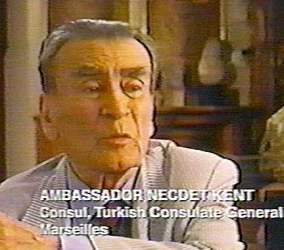 |
|
Necdet
Kent, from DESPERATE HOURS |
At that time in France there were two kinds of Turkish Jews. One group
consisted of those Jews who came to France at the end of World War I with the French
occupation forces in Turkey. Those Jews either did not have any Turkish passport, or
even if they did they had expired a long lime ago. The only official document they
had possessed was their birth certificate in Arabic script that they had obtained
from the Ottoman State. Technically, the Turkish consulates regarded those Jews as
“non-citizens”. The French governments before World War II had been lenient on
this matter and condoned their situations. As a result, the Jews in this category
have never bothered to apply to the Turkish consulates or Embassy to regularize
their status. Those in the second category comprised the Jews who had left Turkey
with a valid passport, but at the outbreak of World War II they had not returned,
and stayed in France. These Jews were regarded as “regular” Turkish citizens.
When Northern France had been occupied by Nazi Germany, along with the indigenous
population the Turkish Jews as well made an exodus to the South, and came within our
jurisdiction. The French authorities dubbed the non-French refugees as “Repliés”
(In English retreated or receded). The situation in the South was far from being
comfortable at that time, but when the German troops invaded southern France as well
it became oppressive.
As soon as the Nazis took control of the region they began to search for the Jews
and made arrangements to transport them to Germany in trains. At this time we
received occasional complaints from the Jews who were Turkish citizens, which
prompted us to take some action.
We made an appeal to all the Jews to apply to the Consulate in order to legalize
their status. If the status of the Jews who had applied to our Consulate was
regularized, we immediately issued a certificate of citizenry. If they owned any
businesses, stores, etc., we admonished them to display in a prominent place of the
premises a notice that we provided. This notice stated that the owner of the
establishment was a Turkish citizen, and that the premises and its contents were
under the protection of the Republic of Turkey. In the cases where the status of the
Jews was not regularized, we asked them to fill out an application form, and issued
a temporary certificate as testimony to their Turkish citizenship, which also
advised the authorities that the official documents of the person concerned were
being processed, and that the permanent papers would soon be issued to replace the
interim certificates. These measures proved helpful and protected several Turkish
Jews against troubles.
There have been times that our Consulate staff called on the Gestapo headquarters
(sometimes three or four times a day) to solicit the release of our Jewish citizens
who had been detained. Most of the times these efforts entailed persuasion, but
sometimes we had to utter subtle threats to take up the matter with higher
authorities. To make matters worse, the Italians as well had started to emulate the
Germans and applied similar practices in their regions. At times we had arguments
with the Italian consul to persuade him to stop this inhuman treatment of the Jews.
I later learned that my efforts had borne fruit to some extent.
In one instance the anti-Jewish obsession manifested by the Gestapo reached
dimensions that defied human dignity. For a while the military patrols had started a
new practice to identify the Jews. This involved stopping the men whom they had
suspected to be Jews right on the street, and making them drop their pants to see
whether they were circumcised. This exercise led to the arrest of several Jews, as
well as Muslim Turks. Many of them indiscriminately were taken to detention centers
for a summary transportation to Germany. To protest and to put a halt to this
ill-advised practice, I immediately went to the Gestapo Headquarters, and explained
to the commandant that being circumcised had nothing to do with being a Jew. From
the empty stare in his eyes I figured that he had not understood what I meant.
Thereupon, I requested that a doctor examine me to further clarify my point. This
came as a revelation to him, and he agreed to release several people.
The climax of all these efforts, however, came about in a showdown with the Gestapo
authorities during a period of time when the Consul General was on leave and away
from the office. One night, one of our employees, Sidi Iscan, a Turkish Jew from the
city of Izmir, who was at the same time a translator in the consulate came to my
home unexpectedly. (Sidi Iscan also passed away). He appeared to be in fear and
agitated. In tears, he told me that the Germans had rounded up some 80 Jews in the
city and took them to the train. I tried to calm him down, and assured that we would
do something about it. We immediately went together to the Gare Saint-Charles, the
main train station of Marseilles.
We approached the train and observed the situation for a brief moment. The sight was
indeed beyond any imagination. We heard crying and moaning sounds coming from inside
the boxcars. Through some partly open sliding doors we saw human beings crammed in
the wagons. On the side of the cars I noticed the following words:
“This car holds 20 cattle and 500 kilo of feed.” My anger and desolation were
overwhelming. I requested an explanation from the responsible person, whoever he
was, for this undertaking. The Gestapo officer in charge came to the scene, and in
an overbearing tone he demanded to know the reason for my being there. Restraining
myself to remain within the limits of diplomatic courtesy, I told him that there
must have been a gross error, a misunderstanding, because those people were Turkish
citizens, and I demanded that he rectify this situation immediately. The Gestapo
officer told me that he was merely carrying out the order he had received. Besides,
he said, he was sure that those people were not Turks, but Jews. From his tone and
attitude I sensed that he was adamant and not willing to make any concession.
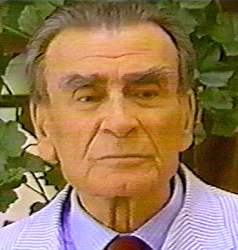 |
|
Necdet
Kent (1911-2002) |
Thereupon, I turned to Sidi Iscan and told him
to follow me, and to get on the train, because we were going in that train as well.
We proceeded to the train with resolve. The Gestapo chief obviously had not
anticipated this move, he tried to convince us to leave the train, but I refused to
listen to him. Shortly afterwards the train pulled out slowly from the station. When
we arrived in Aries or Nimes the train stopped. We saw a number of German officers
getting on the train. They directly came toward me. After a brief and cool exchange
of salutation, the highest ranking officer said in an apologetic tone that there had
been a misunderstanding when the train departed while we were still on board, and if
we left the train at that time they would provide us with transportation (their own
Mercedes-Benz) back to Marseilles. It was an intimation to us that we had to accept
whatever they offered at that time, and any further concession was beside the point.
Yet, on my part I knew that the country I represented was the only hope of those
eighty some innocent Jews, and I could not bring myself to see them go to their
sinister destiny without exhausting all efforts. With this conviction I maintained
that his proposal was unacceptable to us, we had a mission which was to obtain the
release of all those innocent Turkish citizens who had been crammed into cattle cars
on the ground that they were Jews. This act was against the Turkish traditions which
uphold that no humanitarian norms would justify such discrimination, and as a
representative of the Turkish Republic my duty was to protect them to the end. This
critical argument was carried on in an emotionally charged atmosphere, and was being
followed intensely by some Jews in the vicinity. They were aware that the outcome of
this crucial negotiation would determine their fate.
In the face of my intransigent attitude,
perhaps considering the consequences of a possible political contre temps with
neutral Turkey, the officer invited me to declare officially that all those in the
train were Turkish citizens. I somehow felt a flicker of hope, perhaps a turning
point in the whole episode. I readily and solemnly made the declaration he
requested. Thereupon all the German officers left the train, a few minutes later we
followed. When we at last saw them leaving the scene in their cars, we realized that
it was freedom. I will never forget the emotional moment that followed. All of the
freed passengers came to embrace me, held and shook my hands fervently with an
unforgettable expression of gratefulness in their watery eyes. We immediately made
arrangement for all of those people to return to their home. It was almost daybreak
when I arrived at my home. It had been a grueling day but I slept with a deep
contentment that I had never felt before. For years afterward, I received several
cherished letters from the passengers of that fateful journey. Perhaps many of them
are no longer living, but I remember them with deep affection.
Necdet Kent Ambassador (Retired)
THIS DEPOSITION
WAS RECEIVED BY:
Mr. Jak V. Kamhi
President
Profilo Holding A.S.
ATA-USA Winter 1989
|
| Help From Turks
During Desperate Hours |
Columnist Tufan Turenc writes on the documentary recently reported
on by CNN entitled 'Desperate Hours' detailing the help given by Turks during World War
II. A summary of his column is as follows: "In 1933 when the Nazis came to power and
Hitler assumed Germany's leadership, democrats in Germany and particularly German
citizens of Jewish descent were greatly troubled. Scholars were frightened. Mustafa Kemal,
who was closely following the developments in Germany, felt the coming of the tragedy
Hitler was going to inflict upon the world.
Without losing any time, he gave instructions that scholars of
Jewish descent be invited to our shores. More than 200 academics came to Turkey, which
welcomed them with open arms. The Turkish Republic, which faced many problems at the time,
appointed these academics to universities with high salaries. Through the efforts of these
gifted visitors, the quality of education in Turkey got an immediate boost. After their
long stay in Turkey and with the end of Hitler's reich, these academics returned to their
countries. However, none of them forgot Turkey's noble gesture, and they saw our country
as their second homeland. At the beginning of the 1940s, Turkish diplomats prevented
the taking of thousands of Jews to concentration camps through the exertion of great
efforts. This exemplary action of the Turkish Republic and its diplomats was revealed
in a documentary recently prepared by Jews living the US. This striking documentary was
just promoted in CNN International. At a time when we are being suffocated with
publications and programs slandering Turks and Turkey with countless lies, such a
documentary makes one proud. This documentary should be a lesson in humanity to those who
are trying to use history to wreak revenge and foster hostility."
The screening of "Desperate Hours"
Hon. Tom Lantos of CA in the House of Representatives
(Extensions of remarks, May 20, 2002)
Mr. LANTOS. Mr. Speaker, I am honored today to mark a special
occasion, the screening of the film documentary "Desperate Hours," the story of
Turkish assistance to European Jews seeking
to flee the Holocaust. Produced and directed by Victoria Barrett, the film will be shown
at 7:15 p.m. in room HC-7 in the Capitol. I am proud to be a co-sponsor of this event.
Mr. Speaker, I first visited Turkey as a young man in 1956. My wife
Annette and I have returned to enjoy Turkish hospitality many times since. When I first
visited Turkey, it was just a few short years after Turkey had made the crucial decision
to join NATO, where it has always been a loyal Western ally, first against Soviet tyranny,
later against ethnic cleansing in the Balkans, and now against global terrorism.
But what most ennobles Turkey for me is Its role as a savior of so
many Jews during the two greatest Jewish tragedies of the past millennium, the Inquisition
and the Holocaust. During the
Inquisition of the late fifteenth century, the Ottoman Sultan Bayezit invited the fleeing
Jews of Spain and Portugal to find comfort in his realm. The 500th anniversary of this
episode--both sad and redemptive--was marked by Turkish Jews and non-Jews alike in 1992.
The documentary "Desperate Hours" commemorates Turkey's
rarely cited role in that other Jewish tragedy--the greatest crime of the bloody twentieth
century--the Holocaust. Turkey's efforts were as important and dramatic as they are little
known. Turkey offered refuge to hundreds of Germans--non-Jews as well as Jews--during the
1930s. Its diplomats in France, often without waiting for instructions from the capital,
conferred Turkish citizenship on thousands of desperate Jews trapped in Nazi-occupied and
Vichy France. In some cases Turkish diplomats, at great personal risk, stared down Gestapo
officers to protect their new fellow citizens, as was the case with the saintly Necdet
Kent. All this, while Nazi troops stood poised on Turkey's borders.
My wife and I were saved by Raul Wallenberg. I am pleased that the
Turkish versions of Wallenberg are at last receiving their due.
The intimate links between Turks and Jews continue, of course, to this day. A community of
some 25,000 Jews thrives in contemporary Turkey. Tens of thousands of Turkish Jews living
nearby in Israel cherish their links to Turkey. All of this is a testament to the
Muslim-Jewish friendship that has been a hallmark of the Turkish historical
experience.
In recent times, Turkish-Jewish friendship has been enriched and
deepened by the close relations Israel and Turkey have forged in recent years. Journalists
have focused on the security relationship — and that indeed is important — but the non-security aspects of this
relationship are growing even more rapidly: burgeoning commercial trade now worth over a
billion dollars a year, Israeli tourists by the hundreds of thousands flocking
annually to Turkey, and a vibrant intellectual exchange between Turkish and Israeli
universities.
No other Muslim society rivals Turkey's record regarding the Jews;
in fact, few societies of any type anywhere in the world do. I congratulate my dear friend
former Ambassador Baki Ilkin, who
so strongly supported this documentary project, and my dear friend the current Turkish
ambassador Faruk Logoglu. I strongly commend all those associated with the film
"Desperate Hours" for helping to elucidate and publicize one of the most
important chapters in the long, dramatic, and mutually rewarding history shared by the
Jewish and Turkish peoples.
Turkey's version of Schindler's List
Documentary brings Turkey's version of Schindler's List out into the light
Muslims, Jews and Christians work to save lives in Desperate Hours,
filmmaker says
IRWIN BLOCK
The Gazette
Wednesday, February 11, 2004
Documentary filmmaker Victoria Barrett talks about her award-winning Desperate Hours, a
film about Turkey's role in saving European Jews from the Holocaust. It will be shown
tonight in Montreal, and broadcast for the first time in North America tomorrow.
Among acts of conviction and bravery to save imperiled Jews in German-occupied Europe, few
people know of the Turkish heroes of the Second World War.
Meet Necdet Kent, the Turkish consul in Marseille, France, during the dark days of the
early 1940s.
Some call him the Turkish Oskar Schindler for what he did to rescue Jews of Turkish
origin.
Turkey at the time was neutral; Kent and two other Turkish diplomats are estimated to have
saved 10,000 Turkish Jews by insisting the Germans respect their Turkish nationality.
Another 10,000 Jews from Romania and Hungary may also have found refuge in Turkey during
that time.
And it took an Episcopalian from the Shenandoah Valley in West Virginia to record on film
the saga of the Marseille rescue and similar acts of extraordinary humanitarian effort.
 |
|
Victoria
Barrett |
Filmmaker
Victoria Barrett produced the award-winning documentary Desperate Hours, which will be
broadcast for the first time in North America tomorrow on PBS Mountain Lake at 8 p.m.
What drove her to record this chapter in history?
"Today I don't think there is any greater problem facing the world than religious
intolerance," she said in an interview in Montreal.
"This movie tells stories of Muslims, Jews and Christians are working to save lives,
not to kill each other."
Barrett's film will also be shown at the Musée d'Art Contemporain tonight, when Turkish
ambassador Aydemir Erman will be awarded the B'nai Brith interfaith humanitarian award for
Turkey's role in saving Jews.
Discussing the Marseille incident, she noted: "In the middle of the night, someone
comes running into the consulate to say they've rounded up all the Turkish Jews, they're
on a train and they're taking them to one of these camps.
"Necdet Kent got out of bed, he went to the train and sat there as the train left and
travelled with it 60 kilometres.
"Finally the German officer said, 'OK, fine, you can take your people and go. We
don't want an incident.' "
The effort is believed to have saved an estimated 50 to 70 people from certain death.
Barrett's timing was prescient, as all three diplomats, including Namik Yolga in Paris and
Selehatin Vikemen on the island of Rhodes, have died since being captured on film.
"Unbelievable. I'm so glad," said Barrett, an actor who happened to be living in
Turkey when she learned of these little-known deeds and decided to make them the subject
of a documentary.
The film, chosen best documentary at the 2003 Washington Independent Film Festival, relate
other Turkish efforts.
Turkey welcomed 200 German and Austrian academics, two-thirds of whom were Jewish or
partly Jewish, and were forbidden from teaching in 1934.
"Albert Einstein was heading for Turkey, but he got a better offer in the U.S.,"
Barrett remarked.
A surviving professor and several descendants praise Turkey for saving their lives.
In 1941, when the Germans were 80 kilometres from Istanbul, Turkey blew up two bridges to
retard possible invasion. Some Jews moved to Anatolia.
Montreal Gazette
|
Namik
Kemal Yolga
|
Namik Kemal Yolga (1914-2001)
was a Turkish diplomat and statesman , known as the Turkish Schindler . During the
WWII, Yolga was the Vice-Consul at the Turkish Embassy in Paris, France . His
efforts to save the lives of Turkish Jews from the Nazi concentration camps earned
him the title of "Turkish Schindler."
 |
|
Yolga
(1914-2001) |
Namik Kemal Yolga was posted to
Turkish Embassy in Paris in 1940 as the Vice-Consul, his first diplomatic post in a
foreign country. Two months later Nazis invaded France and started their hunt for
the Jews and sent them to a concentration camp in Drancy near Paris. Young Yolga was
brave enough to save the Turkish Jews one by one from the Nazi authorities, drive
them in his car and hide them in safe places. Yolga's determination resulted to save
all the Turkish Jews except one who was later transferred to a concentration camp in
Germany. In his autobiography, Yolga described his efforts as: "Every time we
learnt that a Turkish Jew was captured and sent to Drancy , the Turkish Embassy sent
an ultimatum to the German Embassy in Paris and demanded his/her release,
specifically pointing out that the Turkish Constitution does not discriminate its
people for their race or religion, therefore Turkish Jews are Turkish nationals and
Germans have no right to arrest them as Turkey was a neutral country during the war.
Then I used to go to Drancy to pick him/her up with my car and put them in a safe
house. As far as I know, only one Turkish Jew from Bordeaux was sent to a camp in
Germany as the Turkish Embassy was not aware of his arrest at the time."
The foregoing is from Wikipedia (BEWARE!)
|
| "The Ambassador" Saves 18,200 |
The story of “The Ambassador” or Behiç Erkin:
Behiç Erkin's grandfather was an Ottoman Army Commander. Despite the fact that Erkin was
disabled, he was accepted to the Ottoman Army because of his grandfather's position and he
became the only individual to receive "special authorization" to join the
Ottoman Army Corps of Officers.
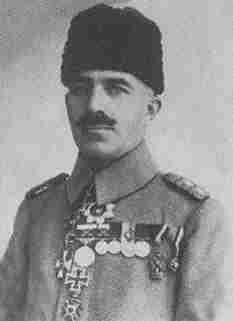 |
|
Behic Erkin,
from WWI days with gold cross |
Erkin was appointed Thessalonica Military Railroad Commisioner and
met Mustafa Kemal Atatürk, the founder of the Turkish Republic, in 1907. He became one of
Atatürk's closest friends and confidants throughout his lifetime.
During the Gallipoli War, Erkin was responsible for successfully transporting logistics
and military personnel to the front, for which he was awarded the German Gold Cross (First
Degree), the highest award given by the Germans and French Legione D'Honneur (First
Degree).
Erkin was asked by Atatürk to head the newly formed Turkish Railroad Administration
during the War of Independence. It was one of the most important and vital posts for the
war years as it shouldered the transportation of army and logistics to various fronts
during the war.
Atatürk gave Behiç his last name, "Erkin," which means independent, on Feb. 8,
1935 and said, “When Behiç has a firm conviction, even I can't change his mind.”
After the War of Independence, Erkin was awarded the "Independence Medal." He
became a member of the newly established Parliament and later the Public Works Ministery.
After the death of Atatürk in 1938, İsmet İnönü came to power and İnönü
sent Erkin to France as Turkish ambassador to Paris. During his tenure, which coincided
with the Nazi occupation in France, he ensured that Nazi officials did not confiscate the
properties of Turkish citizens of Jewish origin living in France.
The registered number of Turkish Jews was about 10,000 but there were about 10,000
unregistered Jews, whose origin can not be identified as to whether they were Turkish or
not.
He opposed the French authorities and granted Turkish citizenship to those who called
themselves Turkish under the pressure of Nazi occupiers who wanted to send the Jews to
concentration camps. He used his golden German medal and personal courage and knowledge to
help secure the return of Turkish Jews.
In order to prevent the French security forces from apprehending the Jews of Turkish
origin from their domiciles, he threatened the French by saying he would have Turkish
flags hung up in front of every house therefore providing diplomatic immunity.
The ambassador provided the safe return of over 18,200 Turkish-Jewish citizens living in
France out of 20,000 by train. Nowhere else did members of the Jewish community survive in
such large numbers under Nazi occupation.
The above is an excerpt from the Feb. 13, 2007 issue of the Turkish
Daily News, and the rest may be read here. It appears Hollywood is interested in "The
Ambassador," a book written by Erkin's grandson, the product of nine years of
research. George Clooney is reported to be considering the role.
Prof. Stanford Shaw, in his book "Turkey and the Holocaust," wrote of 10,000
Turkish Jews, 10,000 irregulars (possibly Turkish Jews, but maybe not), and 400 others for
a total of 20,400. It's pretty remarkable the ambassador saved over 18,000. vs. (for
perspective) Schindler's 1,000.
Unfortunately, many Jews are totally ignorant of the
great deeds of one of their very, very few historic good friends. This is one reason why
so many of the ignorant ones don't think twice before hopping in the same bed with beloved Armenians.
|
|